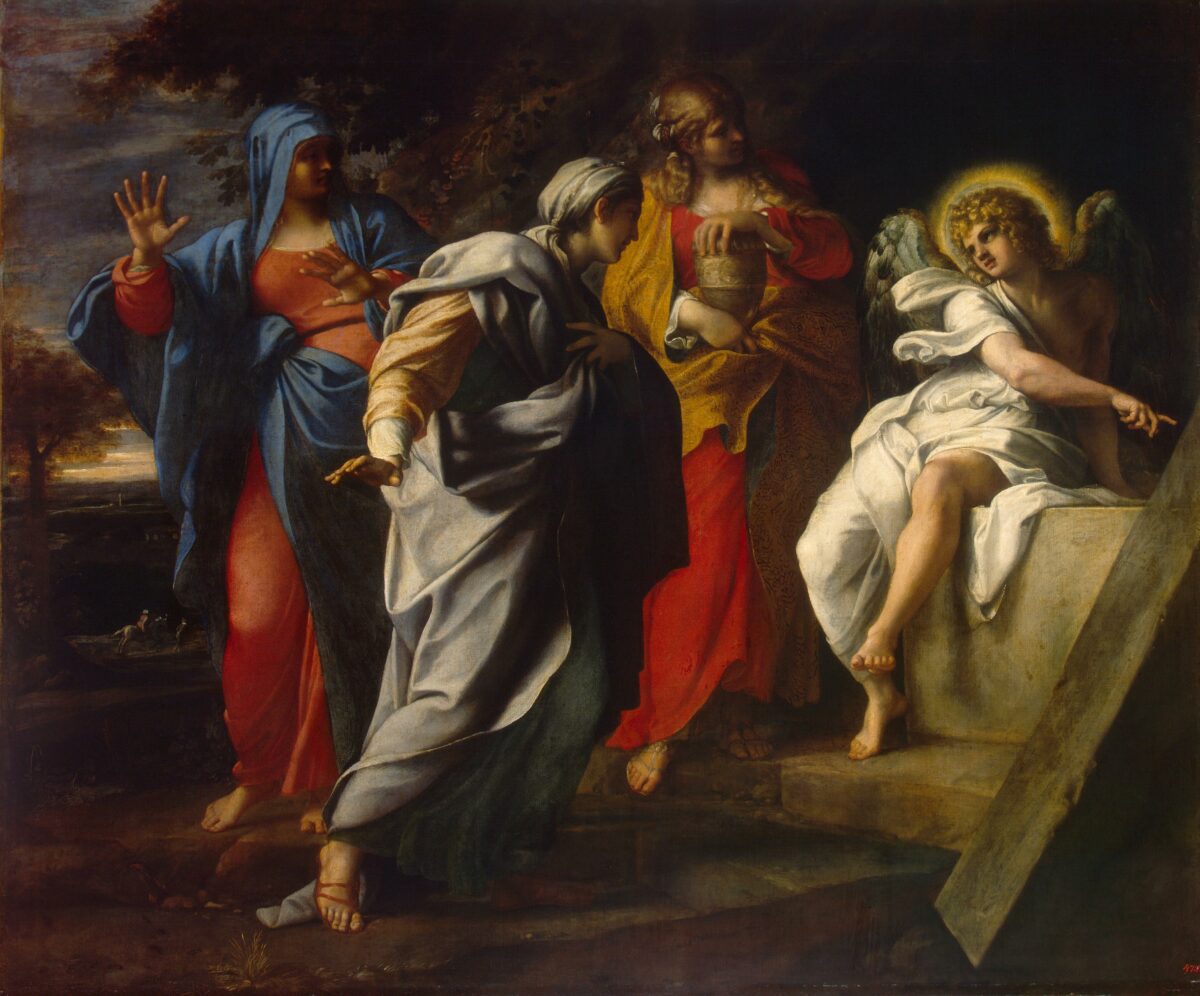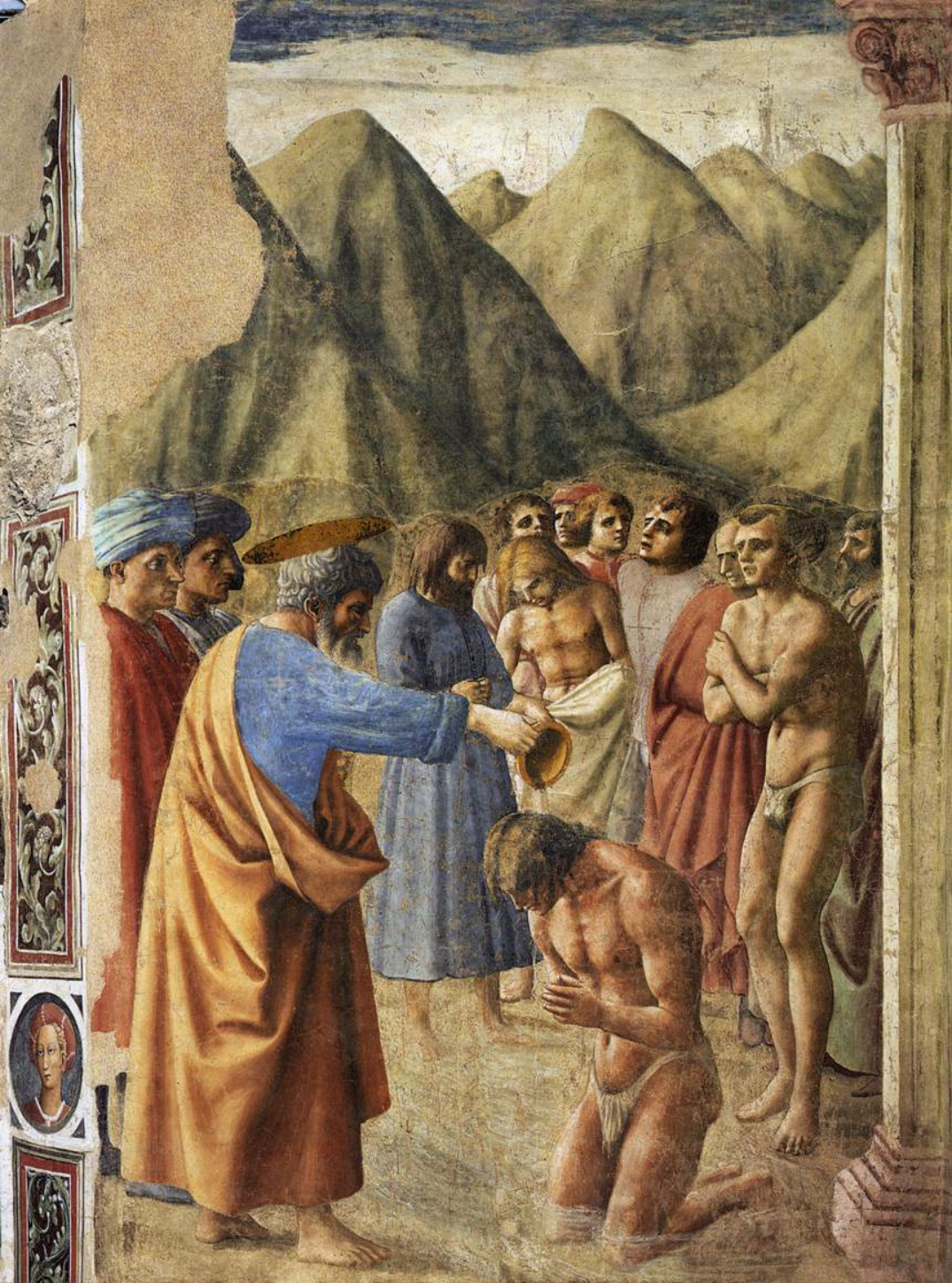EASTER AFTERMATH
Acts 2:14a, 22-32
Second Sunday of Easter
Analysis by Bruce K. Modahl
14 But Peter, standing with the eleven, raised his voice and addressed them, “Men of Judea and all who live in Jerusalem, let this be known to you, and listen to what I say. 22 You that are Israelites, listen to what I have to say: Jesus of Nazareth, a man attested to you by God with deeds of power, wonders, and signs that God did through him among you, as you yourselves know — 23 this man, handed over to you according to the definite plan and foreknowledge of God, you crucified and killed by the hands of those outside the law. 24 But God raised him up, having freed him from death, because it was impossible for him to be held in its power. 25 For David says concerning him,
‘I saw the Lord always before me,
for he is at my right hand so that I will not be shaken;
26 therefore my heart was glad, and my tongue rejoiced;
moreover my flesh will live in hope.
27 For you will not abandon my soul to Hades,
or let your Holy One experience corruption.
28 You have made known to me the ways of life;
you will make me full of gladness with your presence.’
29 Fellow Israelites, I may say to you confidently of our ancestor David that he both died and was buried, and his tomb is with us to this day. 30 Since he was a prophet, he knew that God had sworn with an oath to him that he would put one of his descendants on his throne. 31 Foreseeing this, David spoke of the resurrection of the Messiah, saying,
‘He was not abandoned to Hades,
nor did his flesh experience corruption.’
32 This Jesus God raised up, and of that all of us are witnesses.

Peter Preaching at Pentecost – Benjamin West (1738–1820) http://www.bjumg.org/collections/west_collection/peter.htm
In that water God sets free from the power of sin. Sin no longer has the power to determine how our lives turn out. In those waters we are anointed with the Holy Spirit, the same Spirit that transformed Peter from fearful denier of Christ to enthusiastic proclaimer of Christ.
DIAGNOSIS: The Post-Easter Blues
Step 1: Initial Diagnosis (External Problem): Not Enough
After Jesus rose from the dead, he made a promise to his disciples and then gave them instructions. He said, “[Y]ou will receive power when the Holy Spirit has come upon you; and you will be my witnesses in Jerusalem, in all Judea and Samaria, and to the ends of the earth” (Acts 1:8).
The Holy Spirit transformed Peter from cowardly denier to fearless proclaimer of Jesus. Peter appears to be more than satisfied with the assignment.
The assignment is often not enough for us. We are embarrassed by the depictions of preachers in what we stream across our screens. Novels portray the worst examples of smothering piety. And then there is always that odd uncle who calculates the scandal of the preacher’s wage based on the one or two hours she works on Sunday morning. We are in a helping profession we tell the inquisitive seatmate on the airplane. One friend told of a water-cooler conversation at his office. He acknowledged being in church on Sunday morning. He was answered with the advice, “Get a life.” (FYI: my friend answered that getting a life was why he was in church.)
Step 2: Advanced Diagnosis (Internal Problem): Justifying Ourselves
To justify ourselves we list all that we do as members of the church. We have a food pantry. We send our youth on mission trips to Appalachia. We take up offerings to help victims of hurricanes and tornadoes. We have counseling and give comfort to the sick and shut in.
The problem is no one needs the church or Jesus for any of this. The Y and Boys and Girls Clubs have youth programs. The Red Cross cares for victims of fire and flood. The Rotary Club has eradicated polio from all but two countries in the world. The Equal Justice Initiative takes on racial reconciliation and justice.
The worse problem is we seek to justify ourselves by our good works. Like Peter in the courtyard of the high priest, we demonstrate our lack of trust in Jesus’ promise and the assignment he gives us.
Step 3: Final Diagnosis (Eternal Problem): Worst of All
PROGNOSIS: New Life in Christ
Step 4: Initial Prognosis (Eternal Solution): Best of All
At the little Lutheran college I attended, many of us gathered in the student commons on Sunday night. Once a month a local troubadour came to sing. If their voices had the range, more often than not, they sang Simon and Garfunkel’s “Bridge Over Troubled Water.” We had no idea who Simon and Garfunkel or the local troubadour identified as that bridge. But we would-be pastors and Lutheran school teachers knew it was Jesus. I know it is sentimental, but I still tear up when I hear the song.
Jesus is the one who laid down his life and took it up again to carry us over the grave. He bridges the distance between us and God. He bears all our denial and mistrust. He casts these into the troubled water.
Step 5: Advanced Prognosis (Internal Solution): Troubled Water
The refrain in an African-American spiritual invites us to “wade in the water,” and tells us “God’s a-goin’-a trouble the water” (ELW 459). The song refers to John 5 and the pool of Beth-zatha. Invalids sought healing in the pool when God’s Spirit stirred up the water.
Gathered at the baptismal pool we ask God to stir up the water with the Holy Spirit. By that water God joins us to Jesus’ death and resurrection. In that water God sets free from the power of sin. Sin no longer has the power to determine how our lives turn out. In those waters we are anointed with the Holy Spirit, the same Spirit that transformed Peter from fearful denier of Christ to enthusiastic proclaimer of Christ.
Daily we return to the water, confessing our sin and thereby dying with Christ. Daily we grasp the words of forgiveness and rise with Christ to new life.
Step 6: Final Prognosis (External Solution): More than Enough
The Spirit gives us the confidence to proclaim Jesus Christ, crucified and raised from the dead for our salvation. Word and sacrament comprise our unique calling in the world. We give priority to preaching, liturgy, and catechesis. We witness to our faith in our daily lives.
This does not mean that we turn away from issues of justice and mercy. Rather, as God’s agents we lean into them. We see a new day coming when Christ shall come again. We know the broad outline, the contours, and topography of God’s kingdom. When we feed the hungry, provide relief to the storm tossed, and advocate justice for the oppressed we give witness to God’s kingly rule.





You must be logged in to post a comment.